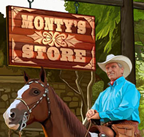Hi there
I have a herd of 5 horses. Two of them at colts and brothers, one of the brothers is totally chilled yet his brother has learnt to kick, well he puts in a buck and kicks out, the other day he almost caught me!
I don't know what to to about it, I would think it was playing but he puts his ears back and does not look like he is happy.
So now I am worried about going in the field and near him as he kicks and is getting worse, he is starting to come at me now and knows I will walk off because at the moment its so muddy its rather not safe to stand your ground.
Any advice?
Thanks
Amber




I'm not an expert, but I believe that your colt needs some behavioral training. My advice that I've learned from Monty is positive reinforcement, letting the bad behavior be difficult and uncomfortable to do, and the right thing to be comfortable. Temple Grandin recommends clicker training techniques to provide a safer horse. I hope this helps. Let me know if you want to know more about clicker training.
Hi Amber,
Since you describe a muddy field, I gather it'll difficult to find a safe arena to do a Join-up with your colt. Still this should be the step that you'd have to take, settling trust and clear roles between you and your youngster. Until you find the safe environment, put a Dually halter on him and do some schooling, to start the path of respect in both directions.
I can imagine your colt having a lot of excess energy after a winterseason, so put him to work and be his leader.
Good luck,
Miriam
Maybe this is not a normal behaviour. Monty writes in his books that agressive horses (against men) have often been grown up by humans. They don't know very well the Equus language. They treat you like a horse, not like a human. Is that the case? Those horses seem to be very difficult to manage. Anyway, you probably need professional help with this dangerous horse.
My projection here is perhaps a slight addition, or addendum to what has been said so far on this very subject. My mare was born in captivity (her mom was adopted from the Nevada Mustang herd). She was born with loving people around her and is very much unaware of the fact that our species can hurt her. She was among horses and was adopted herself at the age of 12 months. I assume Rudi, that when you say that aggressive horses often have been grown up by humans, you are referring to those who are not socialized among horses at the first year of their life. My mare is amazing and while she posses equine language awareness, she certainly behaves as if she knows my language too and is an absolute calm and cooperative girl. I wonder if the issue here is a horse that, like some children, is trying to set boundaries for himself and is realizing that he has more power than he thought he had. Sort of similar to those children who throw a tantrum and realize that mom gives in!! :-)
Hi Amber!
I can only agree in every point mentioned before, but still there are a lot of possibilities about what might be or not be the reason for this new behaviour. Maybe he is really just trying to set boundaries for himself, but I do not think that this is the only thing you have to worry about. I know some horses getting into these strange pattern of behaviour from one day to another, and nearly all of them did also have physical problems. Maybe your colt had an acciddant out in the pasture? He might feel pain, and is afraid of more pain, so that he kickes and bites. I would advise you first to do Join-Up and some work on the Dually Halter. And as soon as he trusts you and is a little calmer, I would coonsult a chiropractor just to check him and maybe adjust his spine. This might be expensive, but it is really worth the money. I hope this could help you.
Yours Jasmin
Hello Amber
.
There is a lot of good advice being given here.
In October 2010 I acquired my first rescue horse. He was weeks away from death when we bought him home. I am pleased to say that he is doing really well now but we had a short period of where he was trying to establish in his own mind whether or not I was worthy to be his leader.
The way I solved the problem was by following these steps in order:
.
1 Achieve Join-Up and then Follow-Up. He joined up with me on the first go but we repeated the activity about 4 times over the following days. This builds respect and a bond. I did Join-Up again with him when he started to challenge me.
.
2 Schooling with the Dually Halter. I taught him to respond to the Dually eg. leading, backing up, rest/reward etc.
.
3 Once solid understanding of the Dually was established, I moved onto scary objects and loading on the trailer.
.
4 Then, I incorporated some Stacey Westfall moves into my routine. Bearing in mind I don't like whips and riding him was out of the question due to his condition, I used a dressage whip as a pointer to tap various parts of his body in order to get him to move them. The dressage whip mearly made my arm longer to keep me safe. No hitting involved in any way.
.
5 Tap the point of the right hip lightly and within 3 seconds, gently pull his head towards you to make his back end move away from you. Eventually you will be able to just point with your finger and he will move his back end away and face you. Do this on both sides. Renacer now will not put his back end to me at all because he knows its bad manners.
.
6. Tap the top of the neck behind the ears lightly until the horse bends his neck away from you. Stop when you get the bend as his reward. Once solid on achieving the bend, tap to get the bend and ask him to take a step away from you. Do on both sides.
.
7. Tap lightly the chest to ask the horse to back up away from you. One step at a time.
.
Doing this allows you to gain some control over the horse's body and where he should place it in relation to you when you are on the ground. This worked wonders for me because Renacer was so wasted away, that I could not ride him but this kind of work enabled me to work with him during his recovery to build a bond based on trust and respect in readiness for riding.
.
Also when the horse moves, stop tapping as that is his reward (rub the forehead too). I also used the Dually Halter during this work as well. Tapping and then using the Dually to help the horse figure out what you are asking of him worked really well. You get to the stage where your body moves and the horse moves. Its great!
.
We are working on the Mounting Block exercise from the Uni now :-)
.
Personnally, I see this behaviour as testing boundaries because Renacer did the same thing for a short time; however some kind of phyisical problem could also be the case and is worth checking out.
.
Renacer and I overcame our leadership testing issues using the Dually and the ground work stated above.
.
Hope this is helpful,
.
Gen
Hi Amber and Gen,
Ths sounds so good, I think here's the key to your solving!
I deeply respect you, Gen, for taking in a rescuehorse and giving him back trust in life and humans. If it's the only thing you would do, saving this precious life is worth all the time and love invested! Please let us know how the story goes on, both of you.
Miriam
Hi Miriam
.
Reading your post brought a tear to my eye. Thank you so much for saying that. I also have a lot of respect for you too. I love reading your posts in the forums because the advice you give is always sound and well grounded.
.
I will let you know how we go. Renacer is a very special horse. Everyone who meets him loves him instantly. No doubt there will be the odd bump in the road from time to time - but that's OK :-)
.
I am really keen to hear how you go Amber. Good luck.
.
Kind regards,
.
Gen
Hi Gen,
What a special instrument this forum is, bringing people from all over the world together, sharing their passion for horses! Thank you for encouraging me, it's so rewarding in all directions. You made my day!
Let's keep on this track all of us and be the change we want to see in the horseworld and our own world with it.
Miriam
http://www.ncbi.nlm.nih.gov/pubmed/20865160
Interesting link, I hope it works...
(Chronic pain as reason for agression against humans)
Hi Rudi
.
Thanks for the article :-) The link worked for me and I read it. My mare, Spins Babe, used to buck when you asked her to canter so we got a chiropractor out to have a look at her and sure enough she needed realignment. She had to rest for about 2 weeks after the manipulation and then my friend rode her again and asked for the canter. You could see that she thought about bucking for a few seconds and then she seemed to realise that there was no pain so she just loped off! Never had a problem since.
.
In her case, the agression was only when you were on her back and asking for the canter or lope - because that was what caused the pain. She was not agressive with people on the ground I assume because this was not the cause of her pain.
.
In the article, it says that none of the horses tested tried to kick the person approaching them - like Amber's little fellow is. The horse's agressive behaviour towards the person on the ground in the study was laying back ears, stretching out the neck, charging etc.
.
Personally, I like to make sure that all the obvious potential causes of discomfort when handling are addressed BEFORE attempting anything with a horse now - these being teeth, feet and spine (from the pole to the tail). I have found that if any one of these things are not right, you can cause pain without even knowing and unwittingly instigate negative or agressive behaviour.
.
In short, I agree that any potential cause for pain should be investigated and eliminated to ensure that positive responses are obtained during schooling.
.
But in Amber's case I think the little fellow needs to learn some manners and after reading her initial post again, it may also be a good idea for her to get some help from a professional trainer just to ensure her safety. A trainer may also be able to identify if there are any physical indicators of pain in the way the little fellow moves etc too.
.
At the end of the day, Amber, your safety is number one :-) and any investigation/investment you make into the behaviour of our horse is worth it to make sure you are safe and he is well mannered and sound ultimately resulting in him having a good life.
.
Investigating these things will make sure that we are the change the horse world needs - just like Mirium says ;-)
.
See you later,
.
Gen
Advice from "Animals Make us Human" book, "The clicker is a help to horse training because it lets the trainer work without food treats for a stretch of time, although you do have to maintain the association between the click and the treat. You can't just charge up the clicker and throw the treats away. But the more important benefits of clicker training are in the way it affects the horse's emotions and the trainer's ability to communicate with the horse. Clicker training starts when the trainer charges up the clicker by pairing the click sound with food. This tells the horse that something good is going to happen. As soon as the click means that, the horse will anticipate the reward to produce a certain behavior."
Amber,
Your horse is displaying undesirable behavior, whether the cause is pain, or playfulness or unhappiness. If he is coming at you with this agressive behavior, I would suggest finding a Monty Instructor to help you, or another trusted pro. In the meantime, keep yourself safe. Don't go into the pasture if you are scared to do so--the horses will know. Wear a helmet and a protective vest if you have one when you go into the pasture to handle the horse! Take a long lead that you can slap over your shoulders or on your legs to help send him away from you and the rest of the horses. Don't be afraid to chuck the end of the lead at him (not the clip end, of course) to reinforce the go away command. Send him away from the group assertively. A boss mare will always send the offending horse out of the herd. When you have to handle the rest of the horses, say to bring them in for dinner, get them in first and leave the offender til last. Don't be afraid to leave him out a few minutes longer than necessary to create in him a desire to come in. Until you can do a J-U with him, these things will help assert your leadership role with him. Without observing him firsthand, I'd have to say he's fighting for a higher place in the herd than he now has, which is understandable. But he doesn't have to do that around you. By all means, have him checked for physical issues when you can. And one last thing: make sure you reward him when he starts to behave nicely. If he starts standing nicely and doesn't fight around the others when you go into the pasture, then handle him first. Give him lots of praise and perhaps a treat in his food bowl when he goes in for the night. Good luck and stay safe!